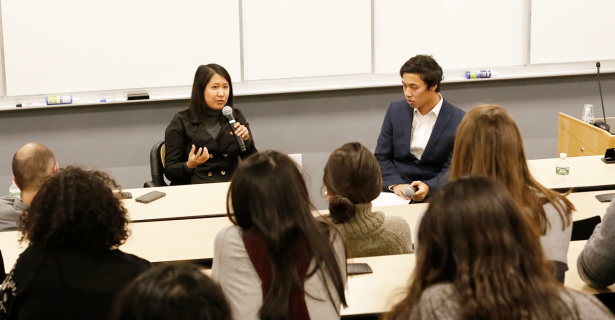Content Warning: This article discusses sexual assault and violence.
On Friday, December 7, Tufts Amnesty International hosted an event regarding sexual violence in Myanmar’s Rohingya crisis, co-sponsored by the Fletcher ASEAN Society. The event centered on the documentary Mother, Daughter, Sister which details the use of rape and sexual violence as a weapon of war against ethnic minority women, and a discussion with Esther Htusan. Htusan was part of the Pulitzer Prize-winning Associated Press team which investigated and reported on forced labor in the fishing industry in Southeast Asia, and she is currently focusing on the human rights abuses occurring in Myanmar.
First, Jeanne Hallacy and Gregg Butensky, the human rights activists and filmmakers behind Mother, Daughter, Sister, spoke. They discussed the process of making the documentary and their vision in undertaking the project. Through the documentary, they hope to convey the importance of having educated populations of girls and women who can define human rights and articulate what needs to be improved in their communities in order to effect long-lasting and fundamental changes.
Then, attendants viewed Mother, Daughter, Sister. The filmshares the stories of four Rohingya and Kachin women, all of whose lives have been affected by rape and sexual violence. Their accounts expose the seriousness of human rights abuses occurring in Myanmar while also revealing the impressive courage of these women as they fight for justice under the threat of the Myanmar military’s brutal and ubiquitous presence. The resilience of these women inspired in viewers a feeling of hope and a renewed commitment to fight for human rights in Myanmar.
After the film screening, Htusan engaged in a conversation with the moderator, Tufts senior Thaw Htet, and the general audience. Htusan discussed her role as a journalist, specifically in terms of the value of journalism, the idea of truth, and what it means to give voice to the voiceless. She further contextualized the Rohingya crisis and the sexual violence perpetrated against women in Myanmar, described the lack of accountability of the Burmese troops and government, and detailed the tactics used by the state to systematically target and traumatize minority groups and increase the antagonistic sentiments of the majority Buddhist population against these minorities. She explained the current inefficacy of the international community’s efforts in Myanmar and the consequent burden on local women’s rights organizations to advocate for justice and human rights.
She concluded with a call to action, urging students and activists to advocate for the people of Myanmar, especially in light of the heightened persecution of journalists by the Myanmar government and the inadequacy of international intervention. Beyond large-scale advocacy efforts targeted at the government and other such institutions, she explained the necessity of engaging in small-scale efforts: even simply sharing the stories of individuals normalizes dialogue about the human rights abuses in Myanmar – ensuring that everyone is informed about the crisis and understands the importance of speaking out – and inspires change. This is exactly what we, as Tufts Amnesty International, are striving to do. While also engaging with a variety of other human rights issues, we are undertaking a year-long campaign on the Rohingya crisis. Through this campaign, we are working to raise awareness about the prosecution of ethnic minorities in Myanmar and spark dialogue about the human rights issues involved in the crisis in order to inspire others to get involved and improve the grave human rights situation in Myanmar.

